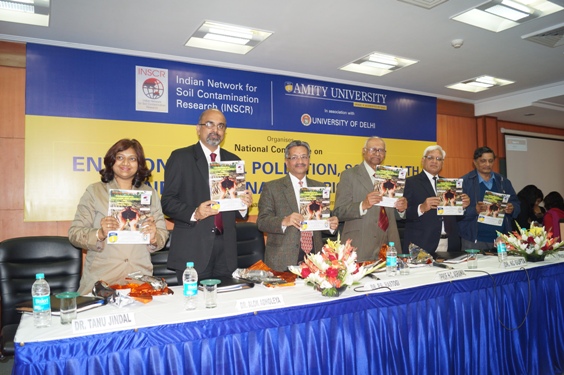15 Jan 2013-17 Jan 2013|Noida | Amity University Campus, Sector-125, Noida
The rapid pace of industrialization has made the soil ecosystem, one of the worst hit victims where 38000 hectares of Land in our country are under Fly ash” avers Scientist during the inauguration of three day long Conference on Environmental Pollution, Soil Health and Sustainable Agriculture

To provide a platform to deliberate on the concerns of soil toxicology, soil contamination, soil management, technologies and its impacts on human health and our approaches to answer these challenges Amity Institute of Environmental Toxicology, Safety and Management (AIETSM) in association with University of Delhi has organized three days National Conference on Environmental Pollution, Soil Health and Sustainable Agriculture’ from January 15 to 17, 2013 at Amity University Campus, Sector – 125, Noida.
Through this conference the deliberations are expected to provide an understanding of the complex interplay of soil, agriculture, and the environment with the underlying concept that soil is elixir of life and is one of the five components of earth, water, fire, air and space, essential to our existence.
Welcoming the august gathering, Dr. Tanu Jindal, Director Amity Institute of Environmental Toxicology, Safety and Management said that environmental pollution influences both soil and agriculture which are the two facets of valuable resource necessary for our sustenance., The rapid pace of industrialization has made the soil ecosystem, one of the worst hit victims. “The development process has ushered in the challenges of soil contamination, microbial and biodiversity loss” remarked Dr. Jindal.
While addressing the gathering Dr. H.C. Agarwal, Vice President, Indian Network for Soil Contamination Research said that it is a well established fact that soil is the mother, it gives us things but never ask anything in return. Everything a plant needs is soil. Our country is reasonably well gifted with natural resources. He stressed that Rich lands, poor people is the biggest problem of our country. Rapid urbanization is causing deforestation; the agricultural land which should be used to grow more crops, is being used for building housing projects.
Dr. Ashok kumar Chauhan, Founder President, Amity Group stressed on the issue of environmental problems and said that these problems have global impacts, are complex and often interrelated with socio-economic factors. Problems of soil contamination, pollution and degradation, loss of biodiversity do not consider political borders and pose major threats to human safety, health and productivity. There is an immediate need to take actions to sustain soil and its immediate environment before it becomes pressing and challenging problem remarked Dr. Chauhan.
Dr. Rup Lal, Professor, Department of Zoology, Dean Examination, University of Delhi quoted that extensive use of pesticides is spoiling the environment. Current growth patterns are affecting the productivity of agricultural soils. It is time to recognize that the economic and social development depends on the protection of the environment emphasized Dr. Lal.
Delivering his addressing note, Dr. K.C. Gupta, Director, Indian Institute of Toxicology Research, Lucknow opined that to find the solution, there should be a problem, first. I t applies very well to today’s theme of the seminar Environmental Pollution, Soil Health and Sustainable. Agriculture awareness among people about how to save environment from pollution can play a vital role in improving the soil health and sustainable development. Future given to the next generation should be healthy and safe. Unplanned industrialization is harmful. Interest in evaluating the quality and health of our soil resources can be stimulated by increasing awareness that soil is a critically important component of the earth’s biosphere, functioning not only in the production of food and fiber but also in the maintenance of local, regional, and global environmental quality can proved to be a great help, added Dr. Gupta.
Dr. P.B. Rastogi, Director (Impact Assessment) Ministry of Environment & Forests said that there is a dearth of awareness among people about healthy environment. We are challenged to develop agricultural management systems that balance the needs for production of food and fiber with those for maintenance of the environment.
Dr Alok Adholeya, Director, Biotechnology and Management of Bioresources Division, TERI (The Energy and Resources Institute) said that everybody of us is greatly affected by these issues on day to day basis. Bringing chemicals into Agriculture system we lost huge context in organic & soil. When we have gone into the mechanic system, we have declined the productivity of soil & increased the productivity of crops. We are also facing many difficulties. He also emphasized on the quantity of fly ash-a coal combustion residue of thermal power plants has been regarded as a problematic solid waste all over the world. Disposal of high amount of fly-ash from thermal power plants absorbs huge amount of water, energy and land area by ash ponds. Therefore, fly-ash management would remain a great concern of the century. “38000 hectares of Land in our country are under Fly ash” remarked Dr. Adholeya. At the end he also suggested that the research can prove to be an exciting journey for students, if they pursue it as their career.
The other related topics discussed in the technical session were Soil contamination and human health, New Generation Pesticide Formulations: Impact on Human Health and Environmental Toxicology, Microorganisms as indicators of soil health, Impact of Global Warming on Weed Threat, Diversity of nifH gene in rhizosphere and non-rhizosphere soil of wheat in Rajasthan, India, Soil Enrichment and Increase of Yield by the Use of Trichoderma, Toxicological Effect of Mercury on Human Health through Soil and Environment, Sources of Soil Contamination with Persistent Organic Pollutants: An Indian Scenario, Organic Agriculture: A Panacea for Soil Sustainability and human health, Effect of Environment Pollution on the Food Quality vis-a-vis Human Health and Heavy Metal Pollution and Role of Phytoremediation.